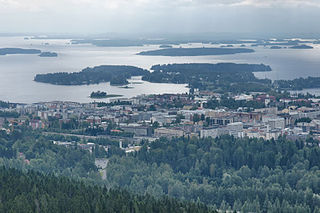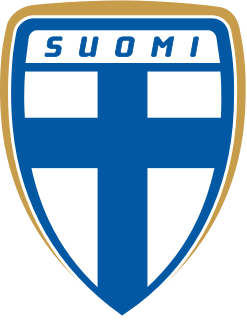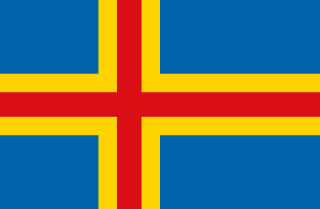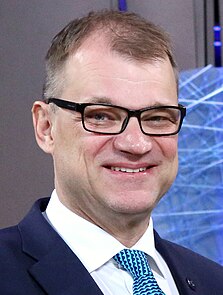
The Continuation War was a conflict fought by Finland and Nazi Germany, as co-belligerents, against the Soviet Union (USSR) from 1941 to 1944, during World War II. In Russian historiography, the war is called the Soviet–Finnish Front of the Great Patriotic War. Germany regarded its operations in the region as part of its overall war efforts on the Eastern Front and provided Finland with critical material support and military assistance.

Helsinki is the capital and most populous city of Finland. Located on the shore of the Gulf of Finland, it is the seat of the region of Uusimaa in southern Finland, and has a population of 650,058. The city's urban area has a population of 1,268,296, making it by far the most populous urban area in Finland as well as the country's most important center for politics, education, finance, culture, and research. Helsinki is located 80 kilometres (50 mi) north of Tallinn, Estonia, 400 km (250 mi) east of Stockholm, Sweden, and 390 km (240 mi) west of Saint Petersburg, Russia. It has close historical ties with these three cities.

The Winter War was a military conflict between the Soviet Union (USSR) and Finland. It began with a Soviet invasion of Finland on 30 November 1939, three months after the outbreak of World War II, and ended three and a half months later with the Moscow Peace Treaty on 13 March 1940. The League of Nations deemed the attack illegal and expelled the Soviet Union from the organisation.

Turku is a city on the southwest coast of Finland at the mouth of the Aura River, in the region of Southwest Finland (Varsinais-Suomi). Turku, as a town, was settled during the 13th century and founded most likely at the end of the 13th century, making it the oldest city in Finland. It quickly became the most important city in Finland, a status it retained for hundreds of years. After Finland became part of the Russian Empire (1809) and the capital of the Grand Duchy of Finland was moved to Helsinki (1812), Turku continued to be the most populous city in Finland until the end of the 1840s, and it remains a regional capital and an important business and cultural center.

Nightwish is a symphonic metal band from Kitee, Finland. The band was formed in 1996 by lead songwriter and keyboardist Tuomas Holopainen, guitarist Emppu Vuorinen, and former lead singer Tarja Turunen. The band soon picked up drummer Jukka Nevalainen, and then bassist Sami Vänskä after the release of their debut album, Angels Fall First (1997). In 2001, Vänskä was replaced by Marco Hietala, who also took over the male vocalist role previously filled by Holopainen or guest singers.
Helsingin Sanomat, abbreviated HS and colloquially known as Hesari, is the largest subscription newspaper in Finland and the Nordic countries, owned by Sanoma. Except after certain holidays, it is published daily. Its name derives from that of the Finnish capital, Helsinki, where it is published.

Jyväskylä is a city and municipality in Finland in the western part of the Finnish Lakeland, some 130 km north-east from Tampere. It is the largest city in the region of Central Finland and on the Finnish Lakeland.

Kuopio is a Finnish city and municipality located in the region of Northern Savonia (Pohjois-Savo). It has a population of 118,667, which makes it the ninth-most populous city in Finland. Kuopio has a total area of 4,326.35 square kilometres (1,670.41 sq mi), of which 719.85 km2 (277.94 sq mi) is water and half is forest. Though the city’s population is a spread-out 74/km2 (190/sq mi), the city's urban areas are populated comparably densely, making Kuopio Finland’s second-most densely populated city.

Jari Olavi Litmanen is a Finnish former footballer. He was the first-choice captain of the Finland national team between 1996 and 2008 in an international career that ran from 1989 to 2010.
Finns or Finnish people are a Finnic ethnic group native to Finland.

The Finland national football team represents Finland in international football competitions and is controlled by the Football Association of Finland.

Sauli Väinämö Niinistö is a Finnish politician and the 12th President of Finland, in office since 2012.

The Football Association of Finland is the governing body of football in Finland. It was founded in Helsinki on 19 May 1907.

Finnish Neopaganism, or the Finnish native faith is the contemporary Neopagan revival of Finnish paganism, the pre-Christian polytheistic ethnic religion of the Finns. A precursor movement was the Ukonusko of the early 20th century. The main problem in the revival of Finnish paganism is the nature of pre-Christian Finnish culture, which relied on oral tradition and of which very little is left. The primary sources concerning Finnish native culture are written by latter-era Christians.

Finland has participated in the Eurovision Song Contest 52 times since its debut in 1961. Finland won the contest for the first time in 2006 with Lordi's "Hard Rock Hallelujah". The country's best result before then was achieved by Marion Rung with the song "Tom Tom Tom" in 1973, which placed sixth.
The Official Finnish Charts are national record charts in Finland composed by Musiikkituottajat – IFPI Finland. The name Suomen virallinen lista/Finlands officiella lista, which is singular in both Finnish and Swedish, is used generically to refer to both the albums and the singles chart, and the context reveals which chart is meant.

The Åland Islands or Åland is an archipelago province at the entrance to the Gulf of Bothnia in the Baltic Sea belonging to Finland. It is autonomous, demilitarised and is the only monolingually Swedish-speaking region in Finland. It is the smallest region of Finland, constituting 0.49% of its land area and 0.50% of its population.
The 2012 Veikkausliiga is the eighty-second season of top-tier football in Finland. It began on 15 April 2012 and ended on 27 October 2012. HJK Helsinki were the defending champions and successfully defended their title.

Juha Petri Sipilä is a Finnish politician who has served as Prime Minister of Finland since 2015. A relative newcomer to politics, he has a successful background in business. He has been the leader of the Centre Party since 9 June 2012. After leading the Centre party to victory in the 2015 general election, Sipilä formed a centre-right coalition and was appointed Prime Minister by the Finnish Parliament on 29 May 2015. On 8 March 2019, Sipilä stated his intention to resign as Prime Minister, citing difficulties in reforming Finland's health care system. President Sauli Niinistö has asked him to continue with a caretaker government until a parliamentary election can be held on April 14.














